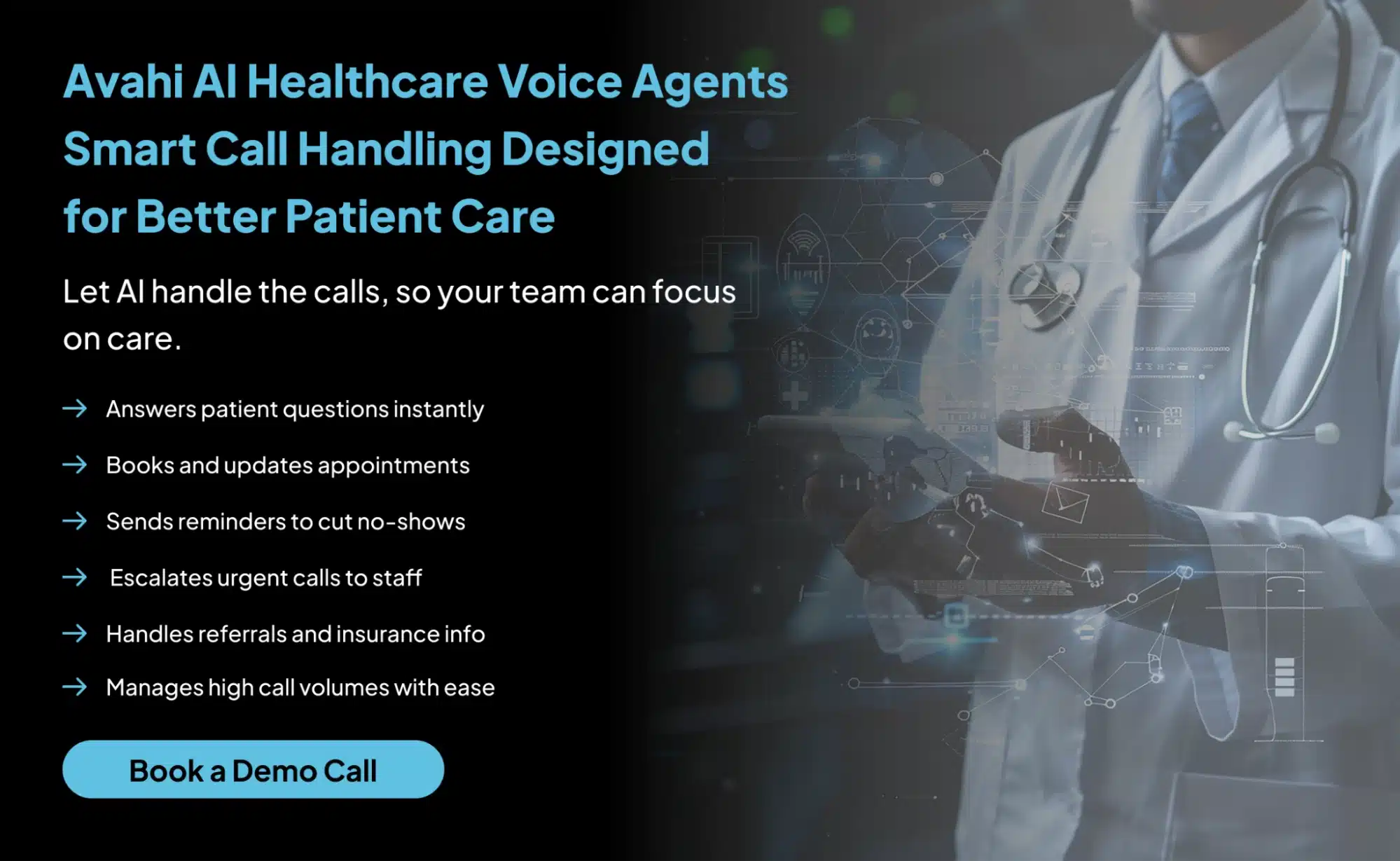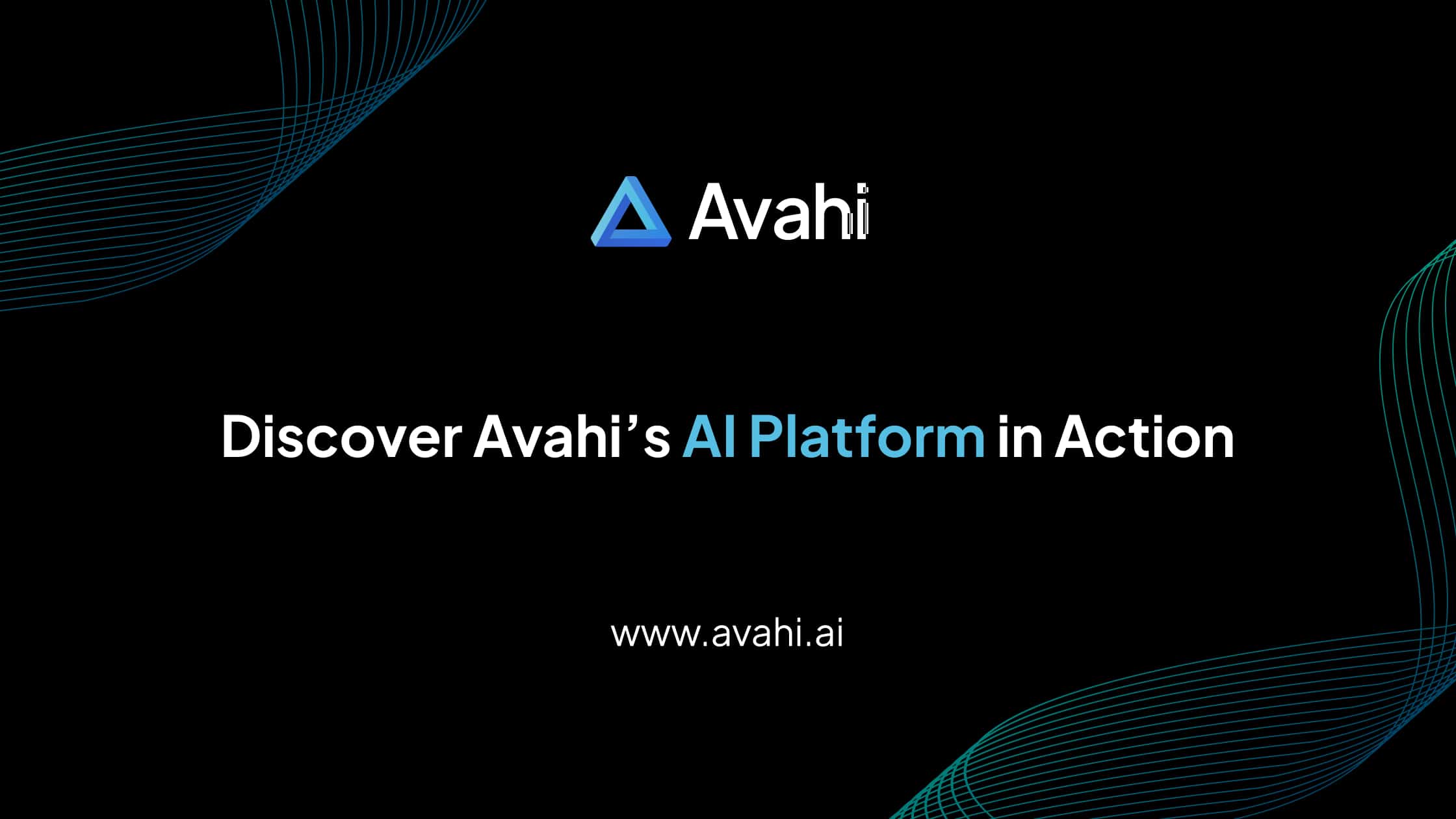How long do your patients wait on hold before speaking to someone?
For many healthcare organizations, the answer is often too long. Call volumes are increasing, staff availability is limited, and most incoming calls concern routine tasks such as scheduling or checking lab results.
According to industry benchmarks, the average abandonment rate in U.S. healthcare call centers is approximately 7%, meaning that nearly one in every 14 callers hangs up before speaking with anyone. In high-demand cases, such as during Medicaid renewal periods, 16 states reported average wait times of 25 minutes and abandonment rates of 29%, with nearly one in three callers giving up before receiving assistance.
This is not just a service issue, it affects patient satisfaction, operational flow, and the overall experience your organization provides.
Healthcare providers are now utilizing AI voice agents to address this issue. These systems can understand natural language, respond accurately, and handle multiple calls at once. They automate high-volume tasks without replacing your staff, freeing them up to focus on complex cases that require a human touch.
In this blog, we’ll explain how AI voice agents are helping reduce wait times. If your team is looking for a scalable and reliable way to improve call center performance, this blog offers a clear starting point.
Why Wait Times Persist in Healthcare Call Centers
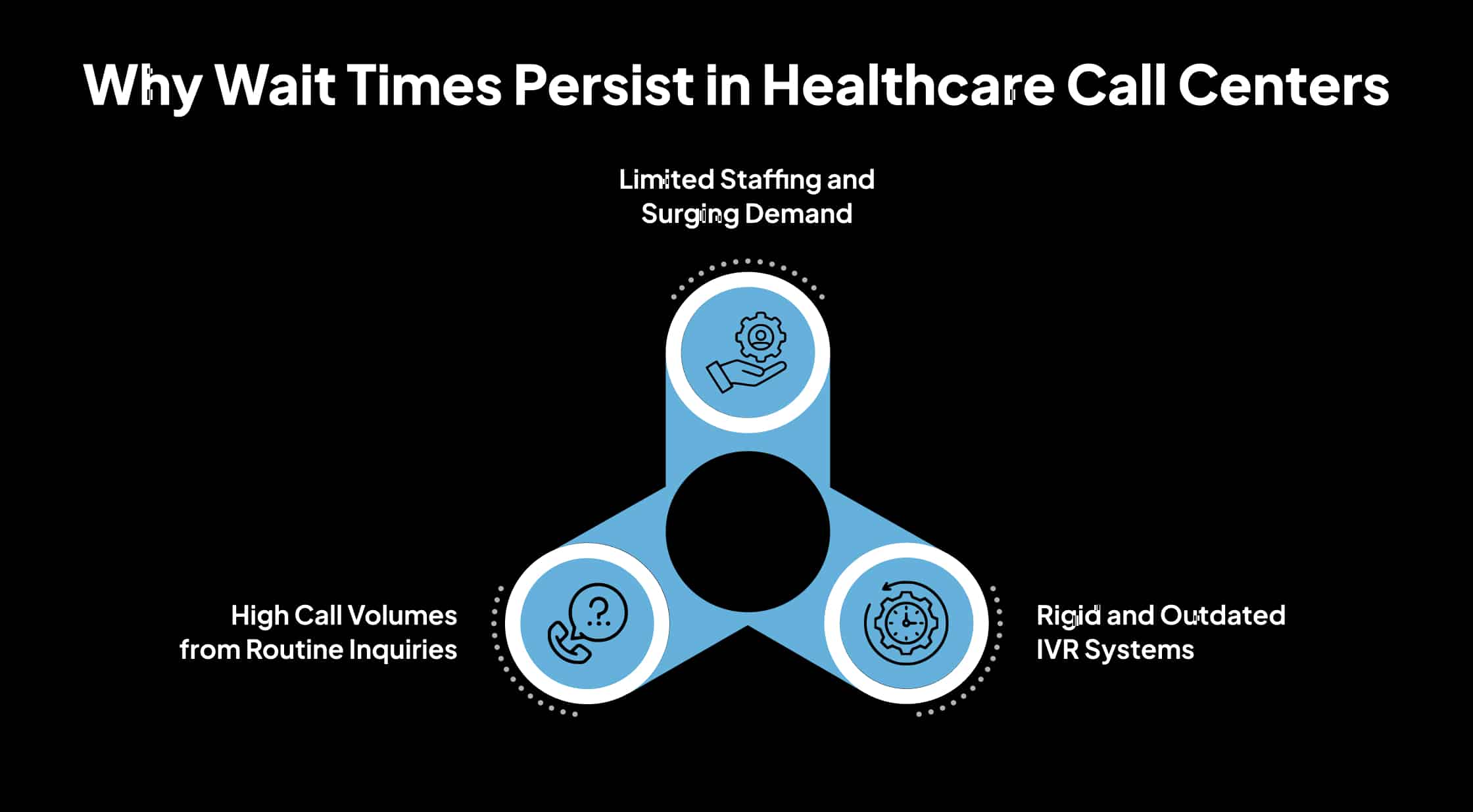
In healthcare call centers, long wait times are mainly caused by high call volumes, limited staffing, and outdated IVR systems. Here’s a closer look at each factor.
1. High Call Volumes from Routine Inquiries
A majority of inbound calls relate to routine tasks such as booking or rescheduling appointments, confirming insurance coverage, and checking lab results. These calls are often repetitive but still require human interaction under regular systems.
The cumulative effect of thousands of such inquiries each day quickly overwhelms call center capacity, mainly when these tasks are spread across limited agent resources. As a result, patients are often left waiting for extended periods of time.
2. Limited Staffing and Surging Demand
Healthcare organizations often struggle to maintain optimal staffing levels due to budget constraints, staff shortages, or seasonal spikes in patient demand. During peak times, such as flu season or public health events, the number of incoming calls can exceed what the available agents can handle.
Since human agents can only manage one call at a time, queues build up quickly. This mismatch between agent availability and incoming call volume creates unavoidable bottlenecks, resulting in longer wait times.
3. Rigid and Outdated IVR Systems
Many healthcare call centers still rely on legacy Interactive Voice Response (IVR) systems. These systems offer limited menu-based options, are incapable of understanding natural language, and require patients to follow lengthy prompts that may not adequately address their needs.
If a caller selects the wrong option or cannot find the right one, they are either redirected repeatedly or left on hold until a human agent becomes available. This adds to patient frustration and also increases the time required to resolve even simple queries, further clogging the queue for others.
What Are AI Voice Agents for Call Centers and Why Are They Important?
AI voice agents for call centers are advanced conversational tools powered by artificial intelligence that surpass traditional Interactive Voice Response (IVR) systems. Unlike IVR, which relies on rigid menus and limited input, AI voice agents can interpret natural language, understand intent, and hold contextual conversations with callers.
AI voice agents are built using natural language processing (NLP) and machine learning, allowing them to understand the way humans naturally speak. This means callers can talk freely, asking questions or making requests without having to use specific keywords or follow a predefined script. More importantly, these agents maintain context throughout the interaction.
For example, if a patient says, “I need to reschedule my appointment,” followed by “Actually, make it next Thursday instead,” the AI can track the context and adjust the booking accordingly, just like a human agent would.
Unlike regular IVR systems that force callers to “press 1 for appointments” or “press 2 for billing,” AI voice agents allow free-form, spoken interaction. This conversational experience is more intuitive, faster, and significantly less frustrating for patients.
Instead of going through a vast number of options, a patient can simply say, “I need to talk to someone about my test results,” and the AI will understand the request and route it appropriately, or handle it directly if possible.
Practical Ways AI Voice Agents Help Minimize Patient Hold Times in Healthcare
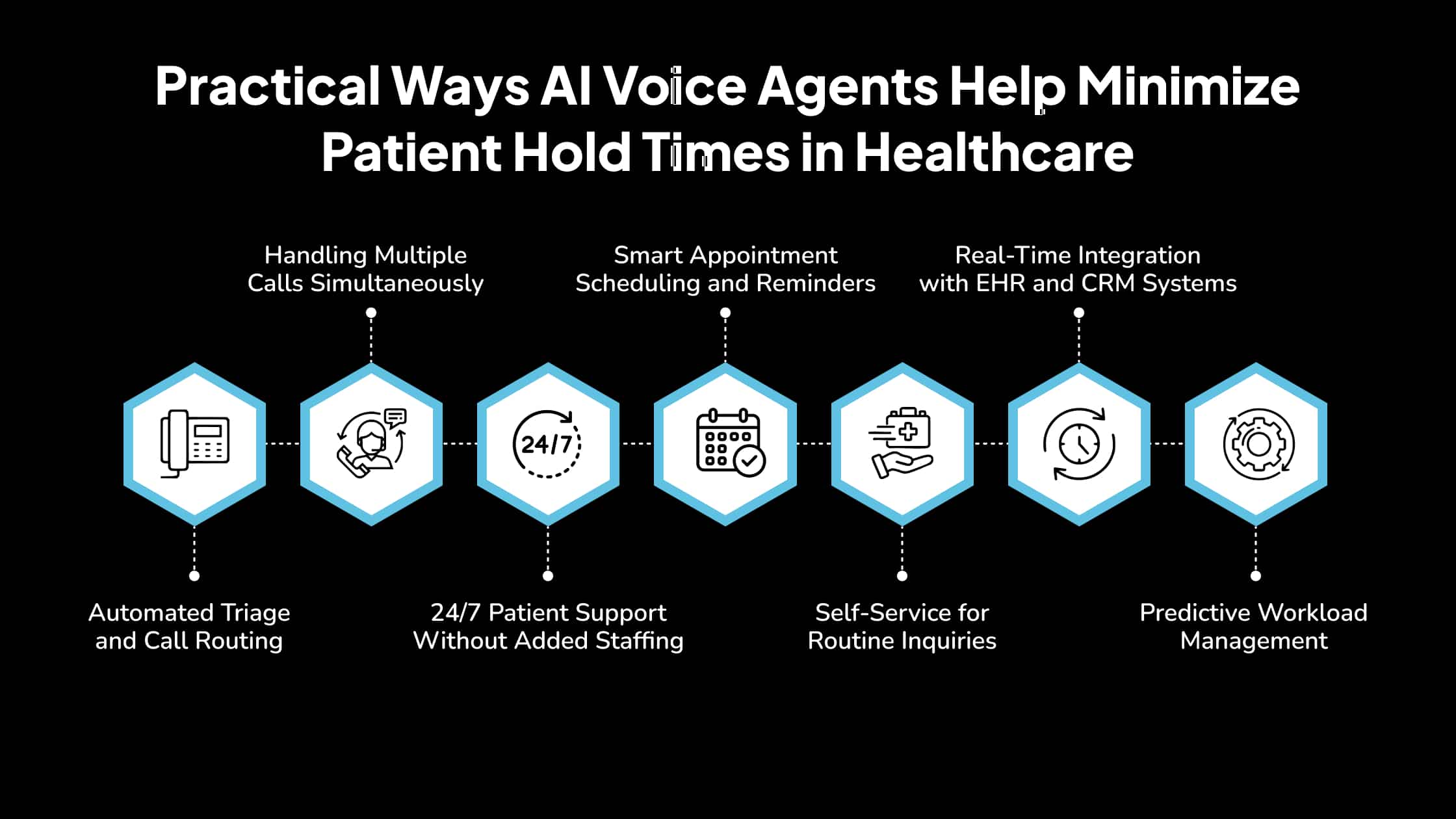
Let’s explore how AI voice agents are transforming healthcare call centers by reducing wait times.
1. Automated Triage and Call Routing
AI voice agents can instantly identify the nature of a patient’s inquiry through natural language processing. Instead of forcing callers through multiple menu options, the system interprets their request. It routes them directly to the appropriate resource, whether it’s self-service, an automated process, or a live agent. This eliminates unnecessary transfers and shortens resolution time from the start.
2. Handling Multiple Calls Simultaneously
Unlike human agents who can only manage one call at a time, AI voice agents can process thousands of calls concurrently. This parallel handling capacity is especially valuable during peak periods, such as flu season or public health emergencies. As a result, fewer callers are placed on hold, and more issues are resolved in real time.
3. 24/7 Patient Support Without Added Staffing
AI-enabled call management systems operate around the clock, providing patients with 24/7 support and assistance. Whether it’s midnight or a weekend, patients can reschedule appointments, receive reminders, or check lab results without waiting for a live agent. This reduces after-hours call surges and levels out traffic during working hours.
4. Smart Appointment Scheduling and Reminders
AI voice agents can access integrated scheduling systems to book, confirm, or cancel appointments directly during a call. They can also send out automated reminders and follow-ups, helping reduce no-shows and the volume of inbound reminder-related calls. This automation ensures faster resolutions and fewer back-and-forth interactions.
5. Self-Service for Routine Inquiries
For common questions like “What are your hours?”, “Where is the clinic located?” or “Is Dr. Kevin available next week?” AI voice agents can provide instant responses without involving a human agent. This offloads a significant portion of daily calls, freeing up staff to focus on more complex tasks and reducing overall queue times.
6. Real-Time Integration with EHR and CRM Systems
AI systems integrated with Electronic Health Records (EHRs) and Customer Relationship Management (CRM) platforms can pull up patient information, verify eligibility, or update contact records instantly. This real-time access prevents delays caused by manual lookups and minimizes the need for multiple follow-up calls.
7. Predictive Workload Management
Advanced AI-based call management platforms can forecast call volume trends using historical data. This allows healthcare organizations to proactively allocate resources or pre-program AI workflows to handle expected spikes. Predictive tools reduce the risk of overwhelming call centers and help maintain short wait times even during sudden demand surges.
Benefits of AI Voice Agents in Shortening Patient Wait Times
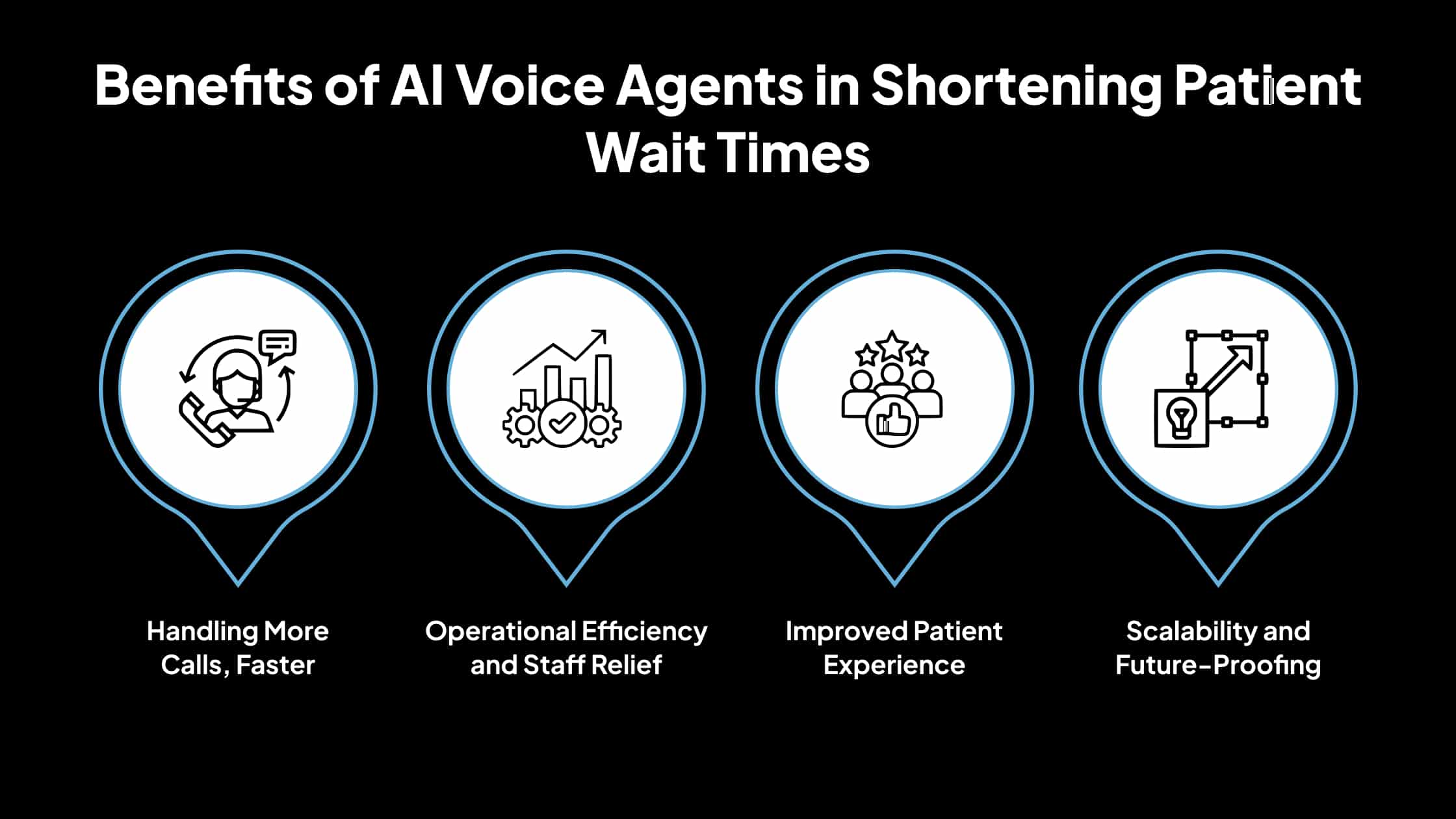
Below is a detailed explanation of the essential areas where AI voice agents make a measurable impact.
1. Handling More Calls, Faster
Unlike human agents who can manage only one call at a time, AI voice agents are capable of handling hundreds or even thousands of calls simultaneously. This ability removes the bottleneck created by limited human resources.
AI agents can triage calls in real time, determining which inquiries can be resolved instantly and which need to be escalated. Studies show that using AI-driven virtual triage can reduce average wait times by nearly 30%, significantly easing congestion during peak hours.
Several healthcare platforms report that AI voice agents can offload up to 70% of front-desk call volume, especially for routine queries. This shortens wait times and increases overall system responsiveness. Notably, patient satisfaction rates have exceeded 90% in some of these implementations, demonstrating that faster service doesn’t come at the expense of quality.
2. Operational Efficiency and Staff Relief
AI voice agents also contribute to smoother internal operations. They can access scheduling systems, insurance databases, and patient records in real time, enabling quick and accurate responses without manual lookups. This streamlines administrative workflows, ensuring that patient information remains current and accurate.
This allowed human agents to shift focus from repetitive tasks to more complex responsibilities that require critical thinking or empathy, such as discussing treatment options or addressing patient concerns. In the long run, this reduces staff burnout and improves job satisfaction.
3. Improved Patient Experience
AI voice agents operate 24/7, offering around-the-clock assistance even outside regular business hours. This ensures that patients can schedule appointments, ask questions, or get updates without needing to wait for office hours. The availability of service at any time of day helps reduce stress and enhances patient confidence.
In addition to accessibility, the conversational nature of AI voice agents feels more natural and intuitive than interacting with a traditional IVR menu. Patients can explain their needs in their own words and receive tailored assistance, making the experience feel more personalized and human.
Automated follow-ups, such as reminders, confirmations, and answers to frequently asked questions, further reduce the likelihood of missed appointments or errors, resulting in improved care coordination.
4. Scalability and Future-Proofing
One of the most significant advantages of AI voice agents is scalability. As call volumes grow, whether seasonally or due to organizational expansion, AI systems can scale instantly without needing to hire and train additional staff. This makes them a reliable long-term solution for maintaining service quality under pressure.
AI voice agents also prepare healthcare systems for future demands. With advancements in generative AI, analysts predict that 75% of new contact centers will deploy AI-powered systems by 2028. Organizations that adopt these tools early will be better positioned to stay competitive, meet patient expectations, and keep up with industry standards.
Avahi AI Healthcare Voice Agents: Enhancing Patient Engagement Through Smarter Call Handling
Managing incoming and missed patient calls remains one of the most time-consuming and costly aspects of healthcare operations. Unanswered calls can result in missed appointments, reduced patient satisfaction, and added pressure on administrative staff. Avahi AI Healthcare Voice Agents are purpose-built to solve this problem, automating routine interactions so that healthcare teams can focus on delivering high-quality care.
Avahi’s voice agents are tailored for clinics, hospitals, and private practices seeking scalable support for patient communication. They are especially effective in high-traffic specialties such as:
- Primary care and urgent care
- Dental and orthodontic practices
- Behavioral health services
- Specialty care clinics
In these settings, where every call can influence the quality and timeliness of care, automation helps maintain continuity, responsiveness, and professionalism.
What Avahi Agents Can Do
Explicitly trained for healthcare scenarios, Avahi’s AI voice system can handle a wide range of patient communications, including:
- Answering routine questions related to office hours, locations, or services offered
- Booking, rescheduling, and canceling appointments in real time through integration with your scheduling system
- Sending automated reminders and follow-ups to reduce patient no-show rates
- Identifying and escalating urgent calls to the appropriate staff for immediate response
- Managing insurance, referral, and prescription-related inquiries efficiently
This smart call handling reduces average response times, keeps appointment calendars full, and ensures urgent needs don’t fall through the cracks. Avahi is deployed on AWS’s healthcare-ready infrastructure, ensuring all data is managed according to top industry standards. The platform is HIPAA-compliant, SOC 2-compliant, and GDPR-compliant.
It integrates smoothly with existing EHRs and practice management tools and can scale across multiple clinics or locations without disrupting operations.
Discover Avahi’s AI Platform in Action
At Avahi, we empower businesses to deploy advanced Generative AI that streamlines operations, enhances decision-making, and accelerates innovation—all with zero complexity.
As your trusted AWS Cloud Consulting Partner, we empower organizations to harness the full potential of AI while ensuring security, scalability, and compliance with industry-leading cloud solutions.
Our AI Solutions Include
- AI Adoption & Integration – Leverage Amazon Bedrock and GenAI to Enhance Automation and Decision-Making.
- Custom AI Development – Build intelligent applications tailored to your business needs.
- AI Model Optimization – Seamlessly switch between AI models with automated cost, accuracy, and performance comparisons.
- AI Automation – Automate repetitive tasks and free up time for strategic growth.
- Advanced Security & AI Governance – Ensure compliance, detect fraud, and deploy secure models.
Want to unlock the power of AI with enterprise-grade security and efficiency? Start Your AI Transformation with Avahi Today!
Frequently Asked Questions
1. How do AI voice agents for call centers improve patient satisfaction in healthcare?
AI voice agents for call centers enhance patient satisfaction by reducing hold times, offering 24/7 availability, and enabling faster resolution for routine tasks. Patients can speak in natural language and get immediate support for scheduling, cancellations, and basic inquiries, without being transferred or stuck navigating lengthy IVR menus. This level of convenience and responsiveness builds trust and improves the overall patient experience.
2.What tasks can AI voice agents for call centers automate in a healthcare setting?
AI voice agents can automate a wide range of repetitive, rule-based tasks that typically burden human agents. These include booking and rescheduling appointments, confirming patient details, checking insurance eligibility, sending reminders, and answering frequently asked questions. By taking over these tasks, AI agents reduce workload on staff and ensure consistent, accurate service.
3. Can AI voice agents reduce call center operating costs for healthcare providers?
Yes, AI voice agents can significantly reduce operating costs by handling a large volume of calls without additional headcount. They reduce the need for hiring more agents during high-demand periods and minimize overtime expenses. Moreover, automation decreases the number of follow-up calls by resolving issues correctly the first time, which translates to further savings.
4. Are AI voice agents secure and compliant with healthcare regulations?
Modern AI voice agents are built with strict compliance in mind. Many solutions are HIPAA-compliant and include features such as call encryption, data privacy controls, and audit trails. When integrated properly with healthcare systems, they adhere to regulatory standards and ensure patient data is handled securely throughout the interaction.
5.What makes AI voice agents more effective than traditional IVR systems in healthcare call centers?
Unlike IVR systems that rely on rigid menus and keypad inputs, AI voice agents understand natural language, manage context, and respond intelligently to patient needs. This enables more fluid conversations and reduces call handling time. Additionally, AI agents can process multiple requests at once, unlike IVRs, which serve one caller at a time. This scalability and improved user experience make AI voice agents a more effective choice for modern healthcare call centers.

